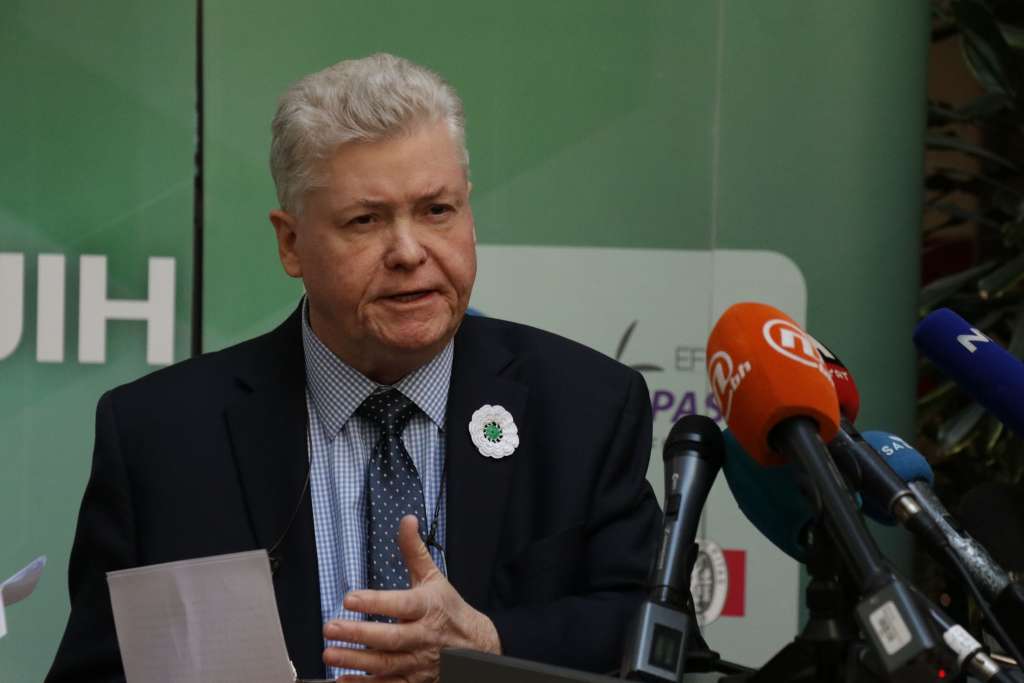Prof. Pettigrew urges UN to condemn glorification of war crimes, genocide denial

On the eve of the 77th anniversary of the liberation of Auschwitz on January 27, 1945, and as the world marks International Holocaust Remembrance Day, the UN General Assembly adopted Resolution A/76/L30, officially condemning Holocaust denial and calling on the Member States to resist denial through education.
The resolution was passed by consensus on January 20 on the 80th anniversary of the Wannsee conference, which formalized a "final solution to the Jewish question," a "solution" that included a plan to exterminate 11 million Jews across Europe. The UN resolution was a response to the worrying rise in Holocaust denial, anti-Semitism, hate speech, and acts of hatred.
Speaking to FENA, David Pettigrew, a professor of philosophy, Holocaust, and genocide at the University of Southern Connecticut, said the resolution, a joint proposal by the Israeli and German ambassadors co-sponsored by Bosnia and Herzegovina and others, called on member states to develop Holocaust education programs prevented future acts of genocide and commends countries that have “actively engaged in the preservation of those places that served as Nazi death camps, concentration camps, forced labor camps and killing sites” to educate present and future generations.
Professor Pettigrew emphasizes the importance of the fact that the Resolution repeatedly emphasizes that remembrance and education are key to preventing future acts of genocide.
UN General Assembly resolution warns that ignoring the historical facts of these horrific events increases the risk of recurrence, which is why it is important to recall that the crimes committed in Srebrenica were declared genocidal by a number of judicial bodies, including the International Criminal Tribunal for the Former Yugoslavia and the International Court of Justice.
He cites as an example paragraph 37 of the verdict in the case of war criminal Radisav Krsti', a former Republika Srpska Army general convicted of genocide, who said that "the law must not shy away from calling the crime ba its real name. Bz seeking to eliminate Bosnian Muslims "Bosnian Serb forces committed genocide".
However, Pettigrew recalls that the Republika Srpska leadership, from BiH Presidency member Milorad Dodik to Srebrenica Mayor Mladen Grujičić, deny the Srebrenica genocide, as well as other crimes that were delcared crimes against humanity and other war crimes.
"They refuse to allow the facts of genocide to be taught in public schools in Republika Srpska, suppressing any educational program. The National Assembly of the Republika Srpska has gone so far as to establish a 'Srebrenica Commission' which is designed to revise the history and deny the legal verdicts and facts of the genocide in Srebrenica," says the professor.
The "Srebrenica Commission Report", which explicitly denies genocide, should be explicitly condemned by the United Nations General Assembly, Pettigrew said.
"In accordance with the content and objectives of the Resolution, the UN General Assembly should officially support the establishment of memorials and museums on the sites of former concentration camps such as Omarska and the warehouse in Bratunac in BiH to educate future generations and prevent the recurrence of genocide in BiH and anywhere else in the world," Pettigrew underlined.
Furthermore, the UN should provide full support to victims' associations in their efforts to mark the 30th anniversary of the opening and operation of the Republika Srpska camp system, including detention and torture camps, and the 30th anniversary of the siege of Sarajevo.
"On the 77th anniversary of the liberation of Auschwitz and the adoption of the UN Resolution condemning the Holocaust denial, it is extremely important to call on the conscience of the world and the UN General Assembly to condemn the denial of genocide, including Srebrenica genocide, crimes against humanity and other war crimes committed from 1992 to 1995," said Professor Pettigrew.
The UN General Assembly should also condemn the glorification of convicted war criminals in Republika Srpska - such as the depiction of a mural by war criminal Ratko Mladić at the entrance to Kalinovik - another insidious form of denial.
"As we remember the victims of the Holocaust, it is our obligation to witness the truth about the genocide in Srebrenica and other genocidal crimes in Bosnia and Herzegovina," concluded in an interview with Fena Professor of Philosophy, Holocaust and Genocide Studies at the University of Southern Connecticut David Pettigrew.
Kakvo je tvoje mišljenje o ovome?
Učestvuj u diskusiji ili pročitaj komentare





 Srbija
Srbija
 Hrvatska
Hrvatska
 Slovenija
Slovenija



























































